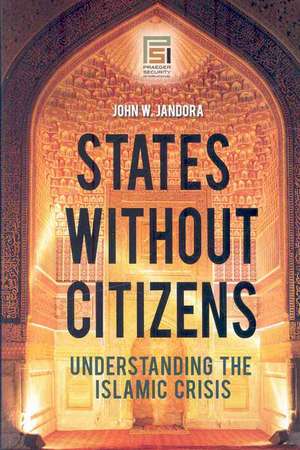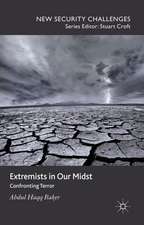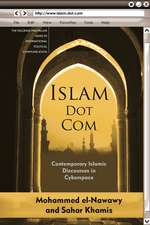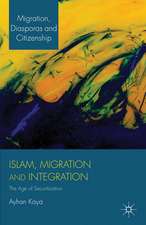States without Citizens: Understanding the Islamic Crisis: Praeger Security International
Autor John W. Jandoraen Limba Engleză Hardback – 29 iun 2008 – vârsta până la 17 ani
Din seria Praeger Security International
- 18%
 Preț: 334.19 lei
Preț: 334.19 lei - 8%
 Preț: 335.53 lei
Preț: 335.53 lei - 34%
 Preț: 376.10 lei
Preț: 376.10 lei - 46%
 Preț: 443.64 lei
Preț: 443.64 lei - 29%
 Preț: 240.11 lei
Preț: 240.11 lei - 8%
 Preț: 304.56 lei
Preț: 304.56 lei - 34%
 Preț: 373.82 lei
Preț: 373.82 lei - 19%
 Preț: 412.79 lei
Preț: 412.79 lei - 19%
 Preț: 338.42 lei
Preț: 338.42 lei - 18%
 Preț: 335.62 lei
Preț: 335.62 lei - 27%
 Preț: 377.35 lei
Preț: 377.35 lei - 27%
 Preț: 376.75 lei
Preț: 376.75 lei - 18%
 Preț: 336.46 lei
Preț: 336.46 lei - 18%
 Preț: 321.73 lei
Preț: 321.73 lei - 27%
 Preț: 384.51 lei
Preț: 384.51 lei - 18%
 Preț: 320.50 lei
Preț: 320.50 lei - 18%
 Preț: 320.50 lei
Preț: 320.50 lei - 18%
 Preț: 321.35 lei
Preț: 321.35 lei - 24%
 Preț: 420.54 lei
Preț: 420.54 lei - 14%
 Preț: 335.99 lei
Preț: 335.99 lei - 18%
 Preț: 355.82 lei
Preț: 355.82 lei - 18%
 Preț: 319.83 lei
Preț: 319.83 lei - 18%
 Preț: 334.28 lei
Preț: 334.28 lei - 32%
 Preț: 354.48 lei
Preț: 354.48 lei - 14%
 Preț: 335.14 lei
Preț: 335.14 lei - 38%
 Preț: 405.98 lei
Preț: 405.98 lei - 40%
 Preț: 571.34 lei
Preț: 571.34 lei - 18%
 Preț: 321.85 lei
Preț: 321.85 lei - 18%
 Preț: 323.25 lei
Preț: 323.25 lei - 18%
 Preț: 253.28 lei
Preț: 253.28 lei - 40%
 Preț: 571.50 lei
Preț: 571.50 lei - 14%
 Preț: 333.72 lei
Preț: 333.72 lei - 18%
 Preț: 301.73 lei
Preț: 301.73 lei - 19%
 Preț: 352.96 lei
Preț: 352.96 lei - 26%
 Preț: 387.80 lei
Preț: 387.80 lei - 18%
 Preț: 302.77 lei
Preț: 302.77 lei - 14%
 Preț: 333.91 lei
Preț: 333.91 lei - 17%
 Preț: 325.80 lei
Preț: 325.80 lei - 24%
 Preț: 338.58 lei
Preț: 338.58 lei - 34%
 Preț: 414.73 lei
Preț: 414.73 lei - 18%
 Preț: 354.30 lei
Preț: 354.30 lei - 29%
 Preț: 254.29 lei
Preț: 254.29 lei - 18%
 Preț: 354.11 lei
Preț: 354.11 lei - 18%
 Preț: 334.38 lei
Preț: 334.38 lei - 14%
 Preț: 302.68 lei
Preț: 302.68 lei - 18%
 Preț: 322.97 lei
Preț: 322.97 lei - 27%
 Preț: 376.50 lei
Preț: 376.50 lei - 27%
 Preț: 322.81 lei
Preț: 322.81 lei - 27%
 Preț: 382.91 lei
Preț: 382.91 lei - 18%
 Preț: 320.87 lei
Preț: 320.87 lei
Preț: 352.20 lei
Preț vechi: 517.48 lei
-32% Nou
Puncte Express: 528
Preț estimativ în valută:
67.39€ • 70.54$ • 56.09£
67.39€ • 70.54$ • 56.09£
Carte tipărită la comandă
Livrare economică 31 martie-14 aprilie
Preluare comenzi: 021 569.72.76
Specificații
ISBN-13: 9780313355905
ISBN-10: 0313355908
Pagini: 130
Dimensiuni: 156 x 235 x 20 mm
Greutate: 0.34 kg
Editura: Bloomsbury Publishing
Colecția Praeger
Seria Praeger Security International
Locul publicării:New York, United States
ISBN-10: 0313355908
Pagini: 130
Dimensiuni: 156 x 235 x 20 mm
Greutate: 0.34 kg
Editura: Bloomsbury Publishing
Colecția Praeger
Seria Praeger Security International
Locul publicării:New York, United States
Notă biografică
John W. Jandora is Supervisory Analyst with U.S. Army Special Operations Command. He is retired from the U.S. Marine Corps at the rank of Colonel, with active service in the Vietnam and Gulf Wars. He is Adjunct Professor of International Relations at Webster University, Fort Bragg-Pope Air Force Base, and a frequent lecturer at U.S. military schools, including the Command and General Staff College. He was twice deployed to Baghdad as a senior advisor in the Iraqi national security arena and served as Senior Advisor to the military and technical schools of the Saudi Arabian National Guard. He is the author of Militarism in Arab Society: An Historiographical and Bibliographical Sourcebook (Greenwood Press, 1997), Saudi Arabia: Cultural Behavior Handbook, and The March From Medina: A Revisionist Study of the Arab Conquests. He took his PhD in Near Eastern studies and Arabic from the University of Chicago.
Cuprins
Introduction1. States Without Citizens: Thesis2. Worlds in Contact, Worlds Apart: Cultures in History3. Kinsmen, not Individuals: Contrast in Ethics4. Mujahideen and Hero-Martyrs: Imagery of Active Virtue5. Modernization and Authenticity: Critique of EndeavorsAppendix: The Emergence of Citizenship in Islamdom Nawaf A. SalamNotesGlossaryFurther Reading
Recenzii
States Without Citizens is an excellent, scholarly study of the difference between the West and the Islamic world over concepts Westerners usually assume have universal meaning, such as freedom and citizenship. Yet in addition to explaining how the societies arrived at their differing positions, Dr. Jandora makes specific recommendations for establishing civic ethics and the concept of public service in Islamic societies that are based on Islamic cultural experiences. For anyone in the diplomatic, military, business, or educational field dealing with any portion of the Islamic world, this small book will be truly invaluable.












